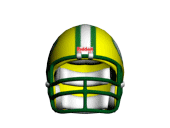Green Bay Packers Team History
 The
incredible saga of the Green Bay Packers began in August 1919,
when the Indian Packing Company agreed to sponsor a local pro
football team under the direction of Earl (Curly) Lambeau. In
1921, the Packers were granted a membership in the new National
Football League. The
incredible saga of the Green Bay Packers began in August 1919,
when the Indian Packing Company agreed to sponsor a local pro
football team under the direction of Earl (Curly) Lambeau. In
1921, the Packers were granted a membership in the new National
Football League.
Today, they rank as the third oldest team in pro football. The
long and storied history of the Green Bay team is one of struggle,
until comparatively recently, for financial survival off the
field and playing stability on the field. The Packers' record
has been punctuated with periods of both the highest success
and the deepest depths of defeat.
Many great football players have performed for the Green Bay
team but two coaches, Lambeau and Vince Lombardi, rank as the
most dominant figures in the Packers' epic. Between the two,
Lambeau and Lombardi brought the Packers 11 NFL championships,
including two record strings of three straight titles, the first
in 1929, 1930 and 1931 and the second in 1965, 1966 and 1967.
Those last three championships completed the Packers' dynasty
years in the 1960s, which began with Green Bay also winning
NFL championships in 1961 and 1962. During the late 1930s and
early 1940s, the Lambeau-led Packers were annual championship
contenders. They won four divisional crowns and NFL titles in
1936, 1939 and 1944.
Individually, Lambeau, Lombardi and 18 long-time Packers players
are enshrined in the Pro Football Hall of Fame. Hall of Fame
players from the early years include Don Hutson, history's first
great pass receiver, Arnie Herber, Clarke Hinkle, Cal Hubbard,
John (Blood) McNally, Mike Michalske and Tony Canadeo. The great
Packers elevens of the 1960s produced Jim Taylor, Forrest Gregg,
Bart Starr, Ray Nitschke, Herb Adderley, Willie Davis, Jim Ringo,
Paul Hornung, Willie Wood and Henry Jordan for the Hall.
Wide receiver James Lofton, who starred for the Packers from
1978 to 1986, was inducted in 2003.
Green Bay, home of the Packers, is still a city of less than
100,000 and is viewed as sort of a sports "dinosaur"
as the only remaining small city in the big-city world of major
league professional sports franchises. Green Bay is unique in
another way -- the team is the only community-owned non-profit
organization in the NFL. From 1937-1994 the Packers played their
home games in two cities. Five of their eight home games were
played in Green Bay's Lambeau Field and the remaining three
at Milwaukee County Stadium in Milwaukee. Today the Packers
play exclusively in Lambeau Field.
The Packers first played on a couple of small fields in Green
Bay and then in 6,000-seat City Stadium beginning in 1925. Eventually,
the City Stadium capacity reached 25,000. On September 29, 1957,
the Packers dedicated a modern $1,000,000 stadium with a 32,150-seat
capacity. Subsequent expansions and renovations have brought
the Green Bay facility, officially named Lambeau Field in 1965,
to its current capacity.
Off the field, the Packers remain a financially sound and competitive
and historically rich franchise. On the field the glory years
are back. In 1996, the Packers returned to the top of the pro
football world when they won Super Bowl XXXI. |